NewsFlash | Brochures
Brochures
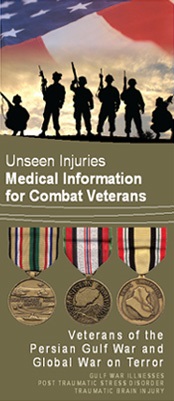 Unseen Injuries: Medical Information for Combat Veterans (Veterans of the Persian Gulf War and Global War on Terror) – Published in collaboration with the U.S. Department of Veterans Affairs (VA), this brochure for was developed under the direction of Oregon Department of Veterans Affairs (ODVA). For VA benefit purposes, Persian Gulf War service is active military duty in any of the following areas in the Southwest Asia theater of military operations at any time August 2, 1990 to present.
Unseen Injuries: Medical Information for Combat Veterans (Veterans of the Persian Gulf War and Global War on Terror) – Published in collaboration with the U.S. Department of Veterans Affairs (VA), this brochure for was developed under the direction of Oregon Department of Veterans Affairs (ODVA). For VA benefit purposes, Persian Gulf War service is active military duty in any of the following areas in the Southwest Asia theater of military operations at any time August 2, 1990 to present.
- Iraq
- Kuwait
- Saudi Arabia
- The neutral zone between Iraq and Saudi Arabia
- Bahrain
- Qatar
- The United Arab Emirates (U.A.E.)
- Oman
- Gulf of Aden
- Gulf of Oman
- Waters of the Persian Gulf, Arabian Sea, and the Red Sea
- The airspace above these locations
Veteran Benefit Brochures – You may be eligible for VA benefits if you are a uniformed Servicemember; Veteran; or spouse, child, or parent of a deceased or disabled Servicemember or Veteran. VA strives to understand the unique issues you face.
GI Bill Benefits Brochure
Home Loan Guaranty Benefits Brochure
Benefits for Disabled Veterans Brochure
Disability Compensation Brochure
Dependents' and Survivors' Benefits Brochure
Survivors and Burial Benefits Kit
VA & DoD Benefits
VA Life Insurance Benefits Brochure
National Guard and Reserve Members and Veterans Brochure
Pension Benefits Brochure
Veteran Readiness and Employment Benefits Brochure
 Mission Ready: Preparing to Fight the Good Fight – Written by Navy Chaplain John Owen, this guide helps us understand that some things are worth fighting for even at the risk of our own comfort.
Mission Ready: Preparing to Fight the Good Fight – Written by Navy Chaplain John Owen, this guide helps us understand that some things are worth fighting for even at the risk of our own comfort.
National VA Chaplain Service – VA Chaplain Service is a vital part of the VA Medical Center, dedicated to providing the highest quality pastoral care to the veteran. Chaplains are on call 24/7. The mission of Chaplain Service is to provide spiritual/religious care to all Veterans and their family members.
Honor – This popular booklet is filled with uplifting messages by Dr. Norman Vincent Peale that will encourage readers to bring out the best in themselves and others. A strong faith in God will help them lead fulfilling lives built on honor and integrity.
Current Research at VISN 20 MIRECC – Whether you are currently on active-duty, a Veteran, or someone who has never worn the uniform, you can participate in NW MIRECC research in Seattle, Washington. Research studies are currently enrolling Military Veterans, First Responders, Health Care workers, and Civilians. Veterans who have experienced a variety of service-related conditions, including Post Traumatic Stress Dsorder (PTSD), Mild Traumatic Brain Injury (mTBI), posttraumatic headaches, neurodegeneration and dementia, and Gulf War illness.
Understanding PTSD and PTSD Treatment – PTSD is a mental health problem that some people develop after experiencing or witnessing a life-threatening event. Find out about PTSD and PTSD treatment from Veterans who’ve been there.
 Real Warriors Outreach Center – The Real Warriors Campaign promotes a culture of support for psychological health by encouraging the military community to reach out for help whether coping with the daily stresses of military life, or concerns like depression, anxiety and posttraumatic stress disorder. The Defense Department’s Psychological Health Center of Excellence has a mission to break the stigma associated with psychological health concerns and encourage those who are coping with a psychological health concern to seek help. The campaign links service members, veterans and their families with care and provides free, confidential resources including online articles, print materials, videos and podcasts. If you or someone you know is coping with any concerns, know that reaching out is a sign of strength.
Real Warriors Outreach Center – The Real Warriors Campaign promotes a culture of support for psychological health by encouraging the military community to reach out for help whether coping with the daily stresses of military life, or concerns like depression, anxiety and posttraumatic stress disorder. The Defense Department’s Psychological Health Center of Excellence has a mission to break the stigma associated with psychological health concerns and encourage those who are coping with a psychological health concern to seek help. The campaign links service members, veterans and their families with care and provides free, confidential resources including online articles, print materials, videos and podcasts. If you or someone you know is coping with any concerns, know that reaching out is a sign of strength.
VHA Community Care Fact Sheet – Veterans may be eligible for care through a provider in their local community depending on their health care needs or circumstances, and if they meet specific eligibility criteria. During a medical emergency, you should immediately seek care at the nearest emergency department (ED). A medical emergency is an injury, illness or symptom so severe that a delay in seeking immediate medical attention would be reasonably expected to be hazardous to life or health.
What to do When... How to Handle Life's Difficulties – Loneliness is one of the most painful human emotions. In this all-new guide, you’ll find 9 common causes of loneliness and what to do to overcome each one. Most important you’ll see how to rely on the One who ensures we are never alone.
Traumatic Brain Injury: A Guide for Caregivers of Service Members and Veterans – TBI subject matter experts from TBICoE, National Intrepid Spirit Center of Excellence, Psychological Health Center of Excellence, and the Department of Veterans Affairs worked together to revise and update the guide. Caregivers of service members and veterans with TBI can download the interactive PDF to use on their smart phones, tablets, and personal computers. Findings from the ongoing Longitudinal Study on Traumatic Brain Injury Incurred by Members of the Armed Forces in OEF/OIF were incorporated into this revision as well.
InTransition Psychological Health Support – A free, confidential program called inTransition offers specialized telephone coaching and assistance for active duty service members, National Guard, reservists, veterans, and retirees who need access to a new mental health provider or wish to initiate mental health care for the first time when: Relocating to another assignment, Returning from deployment, Transitioning between an active duty and a reserve status, and Preparing to leave military service. The inTransition services are available to all military members regardless of length of service or discharge status, by calling 800-424-7877.
 Psychological Health Resource Center – A trusted source of psychological health information and resources related to combat stress, depression, reintegration, how to get into treatment, types of treatment for mental health conditions, and many other topics. Available 24/7 by phone, online chat, or email to service members, veterans, family members, clinicians, commanders, or anyone with a question about psychological health in the military.
Psychological Health Resource Center – A trusted source of psychological health information and resources related to combat stress, depression, reintegration, how to get into treatment, types of treatment for mental health conditions, and many other topics. Available 24/7 by phone, online chat, or email to service members, veterans, family members, clinicians, commanders, or anyone with a question about psychological health in the military.
Ready-To-Use VA Mental Health Materials – Share our readymade materials to educate Veterans about the mental health resources and support available from VA. These materials are designed to build awareness of the mental health challenges that Veterans may face — and the many treatment options available. Download materials for seasonal observances, social media posts for various mental health topics, and general information to share on your website and at outreach events.
State Department of Veterans Affairs in VISN 20 provide both online and print brochures:
- Alaska Office of Veterans Affairs – Documents Library
- Idaho Division of Veterans Services Office – Veterans Services Bulletin
- Oregon Department of Veterans Affairs – VetsNews
- Washington State Department of Veterans Affairs – Resources for Military Families in Washington State
Use of these Materials and Finding VA Health Care
Please note that the health care information provided in these materials is for educational purposes only. It does not replace the role of a medical practitioner for advice on care and treatment. If you are looking for professional medical care, find your local VA healthcare center by using the VA Facilities Locator & Directory. This page may contain links that will take you outside of the Department of Veterans Affairs website. VA does not endorse and is not responsible for the content of the linked websites.
VA Web Disclaimers
Disclaimer of Endorsement: Reference herein to any specific commercial products, process, or service by trade name, trademark, manufacturer, or otherwise, does not necessarily constitute or imply its endorsement, recommendation, or favoring by the United States Government. The views and opinions of authors expressed herein do not necessarily state or reflect those of the United States Government, and shall not be used for advertising or product endorsement purposes.
Disclaimer of Hyperlinks: The appearance of external hyperlinks does not constitute endorsement by the Department of Veterans Affairs of the linked websites, or the information, products or services contained therein. For other than authorized VA activities, the Department does not exercise any editorial control over the information you may find at these locations. All links are provided with the intent of meeting the mission of the Department and the VA website. Please let us know about existing external links which you believe are inappropriate and about specific additional external links which you believe ought to be included.
Disclaimer of Liability: With respect to documents available from this server, neither the United States Government nor any of its employees, makes any warranty, express or implied, including the warranties of merchantability and fitness for a particular purpose, or assumes any legal liability or responsibility for the accuracy, completeness, or usefulness of any information, apparatus, product, or process disclosed, or represents that its use would not infringe privately owned rights.
Reference from this web page or from any of the information services sponsored by the VA to any non-governmental entity, product, service or information does not constitute an endorsement or recommendation by the VA or any of its employees. We are not responsible for the content of any "off-site" web pages referenced from this server.
Disclaimer: The sharing of any non-VA information does not constitute an endorsement of products or services on the part of the VA.
![]()
VA Regional Offices
 The Veterans Benefits Administration (VBA) helps service members transition out of military service, and assists with Veterans with education, home loans, life insurance and much more. Service members, Veterans, their families, and Survivors are invited to request information on VA Benefits including disability compensation, pension, fiduciary, education, Veteran Readiness and Employment (VR&E), Home Loans, and Insurance. In addition to information on VA Benefits Veterans may initiate an intent to file and request assistance with filing compensation and pension claims. Visit regional office websites to learn about the services the regional office provides, directions to the facility, hours of operation, and the leadership team that serves the regional office.
The Veterans Benefits Administration (VBA) helps service members transition out of military service, and assists with Veterans with education, home loans, life insurance and much more. Service members, Veterans, their families, and Survivors are invited to request information on VA Benefits including disability compensation, pension, fiduciary, education, Veteran Readiness and Employment (VR&E), Home Loans, and Insurance. In addition to information on VA Benefits Veterans may initiate an intent to file and request assistance with filing compensation and pension claims. Visit regional office websites to learn about the services the regional office provides, directions to the facility, hours of operation, and the leadership team that serves the regional office.
Find out if you can get VA health care as a Veteran
The following four categories of Veterans are not required to enroll but are urged to do so to permit better planning of health resources:
- Veterans with a service-connected (SC) disability rated at 50% or more.
- Veterans seeking care for a disability the military determined was incurred or aggravated in the line of duty, but which VA has not yet rated, within 12 months of discharge.
- Veterans seeking care for a SC disability only or under a special treatment authority.
- Veterans seeking health registry examinations. VA’s health registry evaluation is a free, voluntary medical assessment for Veterans who may have been exposed to certain environmental hazards during military service. The evaluations alert Veterans to possible long-term health problems that may be related to exposure to specific environmental hazards during their military service. VA has established several health registries to track and monitor the health of specific groups of Veterans. You may be eligible to participate in one or more of these health registries: Agent Orange Registry, Airborne Hazards and Open Burn Pit Registry, Gulf War Registry (includes Operations Iraqi Freedom and New Dawn), Ionizing Radiation Registry, Depleted Uranium Follow-Up Program, and Toxic Embedded Fragment Surveillance Center. Use the chart below to help determine your eligibility.
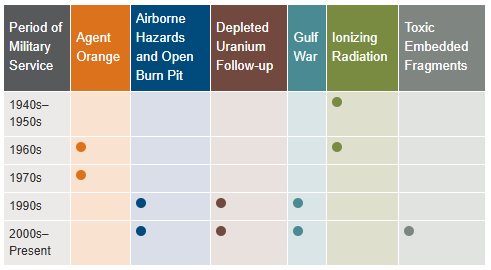
Find out how to apply for VA health care benefits as a Veteran or service member. For other mental health services, contact a VA medical center for information on eligibility and treatment options.
Community Care (Mission Act)
The MISSION Act became law in 2018, bringing the VA’s previous Veterans Choice Program to an end and establishing the Community Care Program. VA provides health care for Veterans from providers in your local community outside of VA. Veterans may be eligible to receive care from a community provider when VA cannot provide the care needed. This care is provided on behalf of and paid for by VA. Community care is also available to Veterans based on certain conditions and eligibility requirements, and in consideration of a Veteran’s specific needs and circumstances. VA offers urgent care services to eligible Veterans at in-network urgent care clinics to treat minor injuries and illnesses that are not life-threatening, such as colds, strep throat, sprained muscles, and skin and ear infections. Community care must be first authorized by VA before a Veteran can receive care from a community provider.
Vet Centers in VISN 20
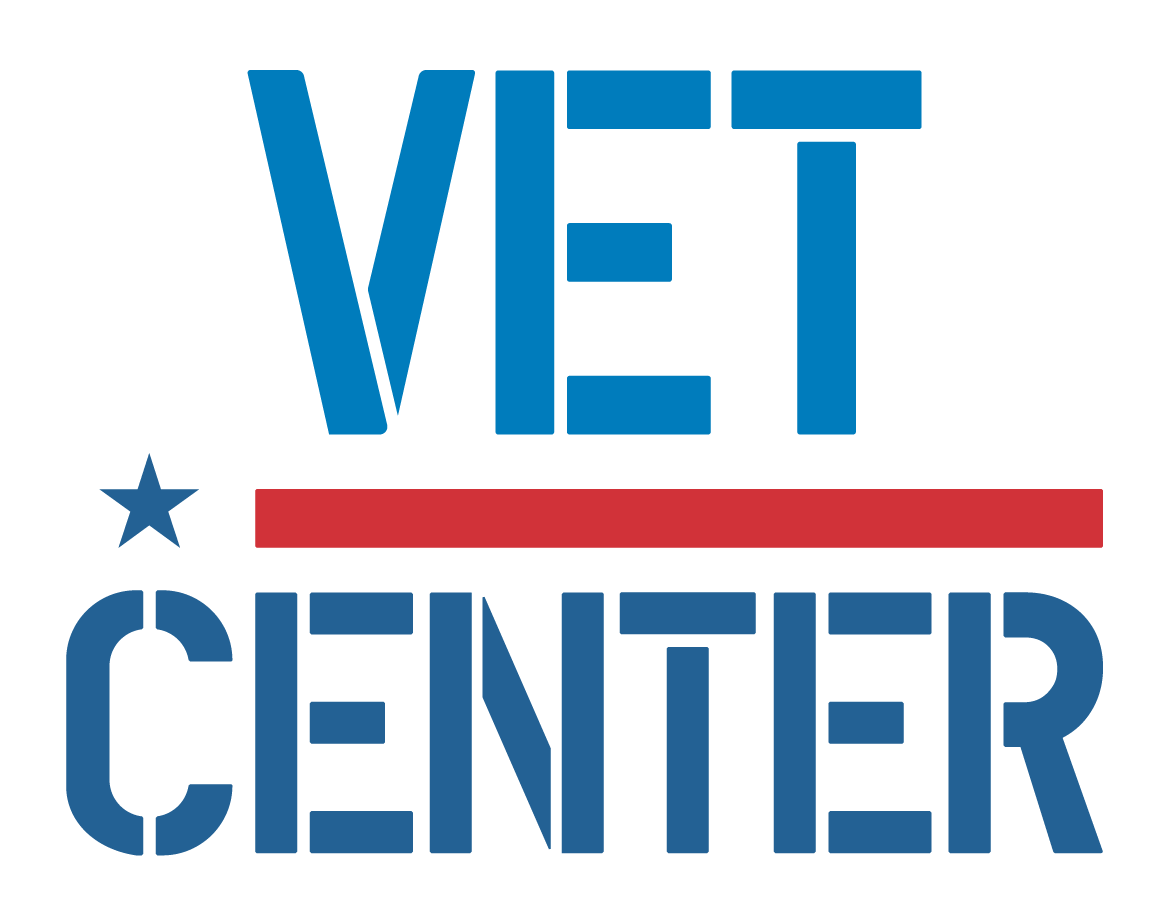 Vet Centers in VISN 20 are community-based counseling centers that provide a wide range of social and psychological services, including professional readjustment counseling to eligible Veterans, active-duty Army, Navy, Marine Corp, Air Force, Space Force, and Coast Guard service members, including National Guard and Reserve components, and their families. 1-877-927-8387 is an around the clock confidential call center where combat Veterans and their families can call to talk about their military experience or any other issue they are facing in their readjustment to civilian life. The staff is comprised of combat Veterans from several eras as well as families members of combat Veterans. This benefit is prepaid through the Veteran’s military service.
Vet Centers in VISN 20 are community-based counseling centers that provide a wide range of social and psychological services, including professional readjustment counseling to eligible Veterans, active-duty Army, Navy, Marine Corp, Air Force, Space Force, and Coast Guard service members, including National Guard and Reserve components, and their families. 1-877-927-8387 is an around the clock confidential call center where combat Veterans and their families can call to talk about their military experience or any other issue they are facing in their readjustment to civilian life. The staff is comprised of combat Veterans from several eras as well as families members of combat Veterans. This benefit is prepaid through the Veteran’s military service.
Alaska
| Anchorage Vet Center (Anchorage, AK) | Fairbanks Vet Center (Fairbanks, AK) |
| Kenai Vet Center Outstation (Soldotna, AK) | Wasilla Vet Center (Wasilla, AK) |
Idaho
| Boise Vet Center (Boise, ID) | East Idaho Vet Center (Idaho Falls, ID) |
Oregon
| Central Oregon Vet Center (Bend, OR) | Eugene Vet Center (Eugene, OR) |
| Grants Pass Vet Center (Grants Pass, OR) | Portland, OR Vet Center (Portland, OR) |
| Salem Vet Center (Salem, OR) |
Washington
Plan your trip to VA
 In 1946, Veterans Canteen Service (VCS) was established by law to provide comfort and well-being to America’s Veterans. With our many retail stores, cafés and coffee shops across the country, we serve those who have served our country. We are a self-sustaining entity providing merchandise and services to Veterans enrolled in VA’s healthcare system, their families, caregivers, VA employees, volunteers and visitors. We are honored to give back to the VA community through many programs established for the health and well-being of our nation’s heroes. Revenues generated from VCS are used to support a variety of programs, such as VA’s Rehabilitation Games, Fisher Houses, Poly-Trauma Centers for OIF/OEF/OND Veterans, disaster relief efforts, Substance Abuse Cessation, VA’s Homelessness initiatives, Women Veterans, Veteran Suicide Prevention and other activities.
In 1946, Veterans Canteen Service (VCS) was established by law to provide comfort and well-being to America’s Veterans. With our many retail stores, cafés and coffee shops across the country, we serve those who have served our country. We are a self-sustaining entity providing merchandise and services to Veterans enrolled in VA’s healthcare system, their families, caregivers, VA employees, volunteers and visitors. We are honored to give back to the VA community through many programs established for the health and well-being of our nation’s heroes. Revenues generated from VCS are used to support a variety of programs, such as VA’s Rehabilitation Games, Fisher Houses, Poly-Trauma Centers for OIF/OEF/OND Veterans, disaster relief efforts, Substance Abuse Cessation, VA’s Homelessness initiatives, Women Veterans, Veteran Suicide Prevention and other activities.
VCS operates over 200 Patriot Stores in Veterans Administration (VA) Medical Centers nationwide. Many of our stores have been recently updated and expanded to provide our customers with a modern, clean and comfortable shopping experience. Our stores welcome our customers with wider aisles, wood-like floors, enhanced lighting and directional signage. PatriotStores have expanded hours of operation to provide service for customers on weekends at most locations.
The Patriot Cafe is the best place in the VA Medical Center to enjoy delicious, freshly prepared breakfast or lunch served hot or cold each weekday. Providing Veterans, their families, VA employees, volunteers and visitors a place to relax and enjoy a meal or take-out for their convenience. With a wide variety of food from traditional comfort food, specialized menu selections and a large assortment of healthy choices; there is something for everyone's taste buds.
Hospital Service Directory
To find out whether there is a van near you use the Disabled American Veterans (DAV) Hospital Service Coordinator Directory to contact your nearest HSC for information or assistance. Please remember that the DAV Transportation Network is staffed by volunteers; therefore, it is unable to cover every community. The vans are driven by volunteers, and the rides coordinated by more than 133 Hospital Service Coordinators around the country. Our nation’s heroes travel around the globe to protect our freedoms—it’s only right that we return their dedication. Volunteering to drive a Vet ensures that even those living remotely from VA hospitals can make their appointments and never go without the treatment they need. Learn more about the DAV transportation network through the VISN 20 NewsFlash Resources section.
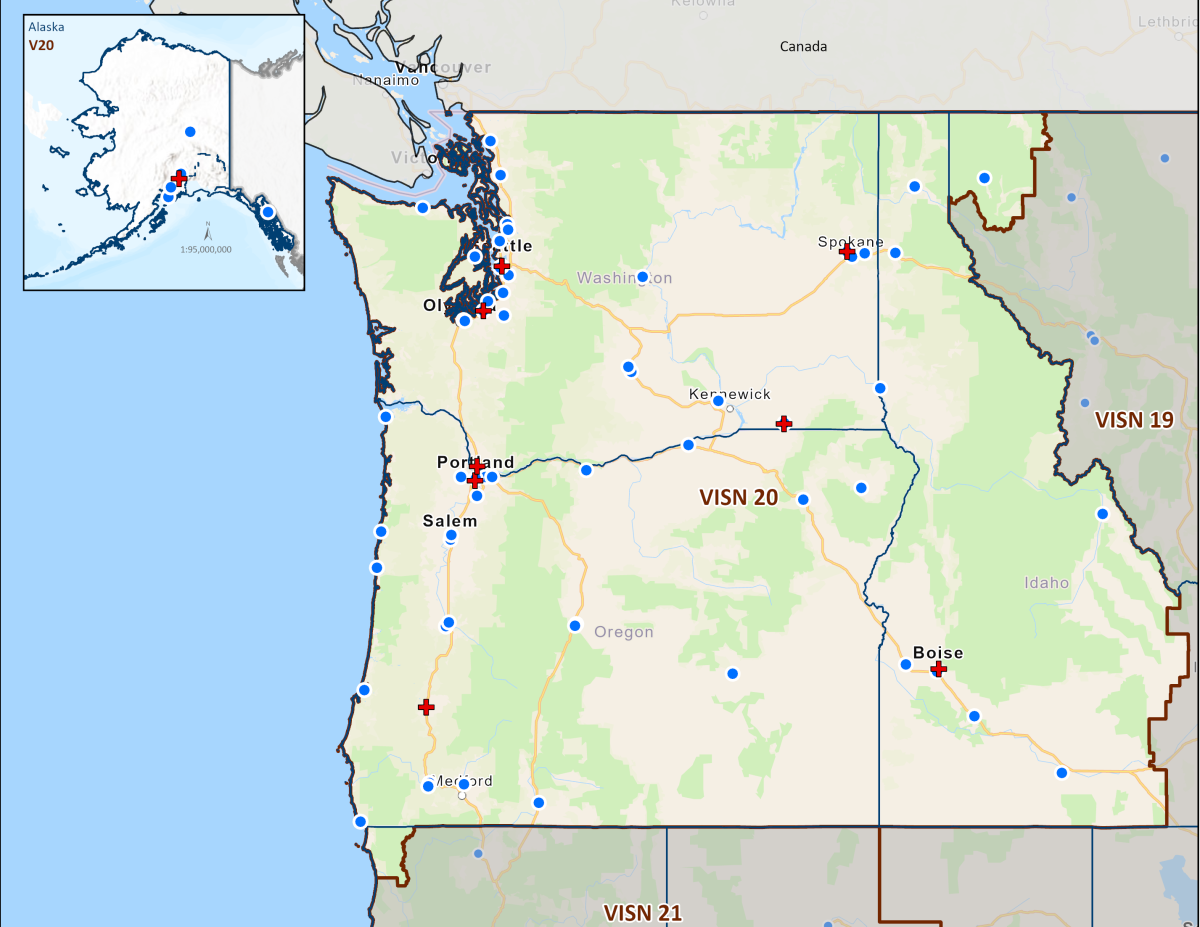 Today's VHA - the largest of the three administrations that comprise the VA - continues to meet Veterans' changing medical, surgical, and quality-of-life needs. VHA is the largest integrated health care system in the United States, providing care at 1,321 health care facilities, including 172 VA Medical Centers and 1,138 outpatient sites of care of varying complexity (VHA outpatient clinics) to over 9 million Veterans enrolled in the VA health care program. There are 18 Veterans Integrated Service Networks (VISNs) in VHA operating as regional systems of care to better meet local health care needs and provides greater access to care. In the Pacific Northwest, VISN 20 serves Veterans in Alaska, Oregon, Washington, most of Idaho, and one county each in California and Montana. Spanning 23% of the US land mass, VISN 20 is the largest geographic region of VA. Operating across three time zones over 817,417 square miles, VISN 20 is home to 273 federally recognized American Indian and Alaskan Native tribes. According to DoD, American Indians and Alaska Natives have one of the highest representations in the United States Armed Forces. VA consults with American Indian and Alaska Native tribal governments to develop partnerships that enhance access to services and benefits by Veterans and their families. VA is committed to ensuring that Native American Veterans and their families are able to utilize all benefits and services they are entitled to receive. As of the end of FY2024, 39% of VISN 20 enrollees resided in rural or highly rural areas.
Today's VHA - the largest of the three administrations that comprise the VA - continues to meet Veterans' changing medical, surgical, and quality-of-life needs. VHA is the largest integrated health care system in the United States, providing care at 1,321 health care facilities, including 172 VA Medical Centers and 1,138 outpatient sites of care of varying complexity (VHA outpatient clinics) to over 9 million Veterans enrolled in the VA health care program. There are 18 Veterans Integrated Service Networks (VISNs) in VHA operating as regional systems of care to better meet local health care needs and provides greater access to care. In the Pacific Northwest, VISN 20 serves Veterans in Alaska, Oregon, Washington, most of Idaho, and one county each in California and Montana. Spanning 23% of the US land mass, VISN 20 is the largest geographic region of VA. Operating across three time zones over 817,417 square miles, VISN 20 is home to 273 federally recognized American Indian and Alaskan Native tribes. According to DoD, American Indians and Alaska Natives have one of the highest representations in the United States Armed Forces. VA consults with American Indian and Alaska Native tribal governments to develop partnerships that enhance access to services and benefits by Veterans and their families. VA is committed to ensuring that Native American Veterans and their families are able to utilize all benefits and services they are entitled to receive. As of the end of FY2024, 39% of VISN 20 enrollees resided in rural or highly rural areas.
VA Medical Centers within VISN 20
Colonel Mary Louise Rasmuson Campus of the Alaska VA Healthcare System, Anchorage, Alaska
VA Boise Medical Center of the Boise VA Healthcare System, Boise, Idaho
VA Portland Medical Center of the Portland VA Healthcare System, Portland, Oregon
VA Roseburg Medical Center of the Roseburg VA Healthcare System, Roseburg, Oregon
VA White City Medical Center of the VA Southern Oregon Healthcare System, White City, Oregon
VA Seattle Medical Center of the VA Puget Sound Healthcare System, Seattle, Washington
Mann-Grandstaff Department of Veterans Affairs Medical Center, Spokane, Washington
Jonathan M. Wainwright Memorial VA Medical Center of the VA Walla Walla Healthcare System, Walla Walla, Washington
VA Puget Sound Health Care System (VAPSHCS) serves Veterans from a five-state area in the Pacific Northwest with two main divisions: American Lake VA Medical Center and Seattle VA Medical Center. Veterans Medical Centers are also located in Spokane, Vancouver, and Walla Walla. VA Outpatient Clinics and Vet Centers are located in Bellingham, Bellevue, Bremerton, Edmunds, Everett, Federal Way, Lacey, Mount Vernon, Olympia, Port Angeles, Puyallup, Richland, Renton, Silverdale, Seattle, Spokane, Union Gap, Vancouver, Walla Walla, Wenatchee, and Yakima.
VA Portland Health Care System (VAPORHCS) serves Veterans in Oregon and Southwest Washington with two main divisions: Portland VA Medical Center and Vancouver VA Medical Center. Veterans Medical Centers are also located in Roseburg, White City, and Vancouver, Washington. VA Outpatient Clinics and Vet Centers are located in Astoria, Bend, Boardman, Brookings, Eugene, Fairview, Grants Pass, Hines, Hillsboro, Klamath Falls, LaGrande, Lincoln City, Newport, Portland, Salem, The Dalles, and West Linn.
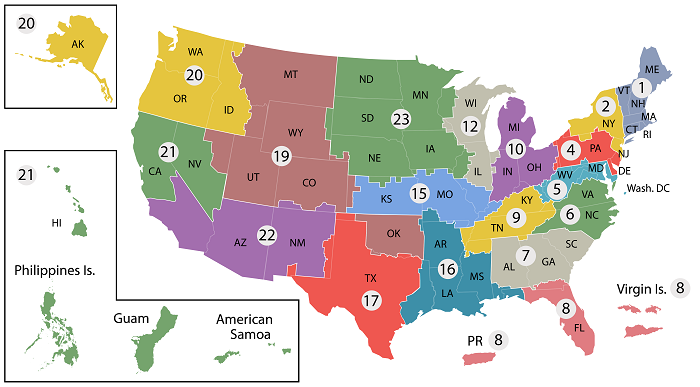
- VISN 1: VA New England Healthcare System
- VISN 2: New York/New Jersey VA Health Care Network
- VISN 4: VA Healthcare - VISN 4
- VISN 5: VA Capitol Health Care Network
- VISN 6: VA Mid-Atlantic Health Care Network
- VISN 7: VA Southeast Network
- VISN 8: VA Sunshine Healthcare Network
- VISN 9: VA MidSouth Healthcare Network
- VISN 10: VA Healthcare System
- VISN 12: VA Great Lakes Health Care System
- VISN 15: VA Heartland Network
- VISN 16: South Central VA Health Care Network
- VISN 17: VA Heart of Texas Health Care Network
- VISN 19: Rocky Mountain Network
- VISN 20: Northwest Network
- VISN 21: Sierra Pacific Network
- VISN 22: Desert Pacific Healthcare Network
- VISN 23: VA Midwest Health Care Network



















